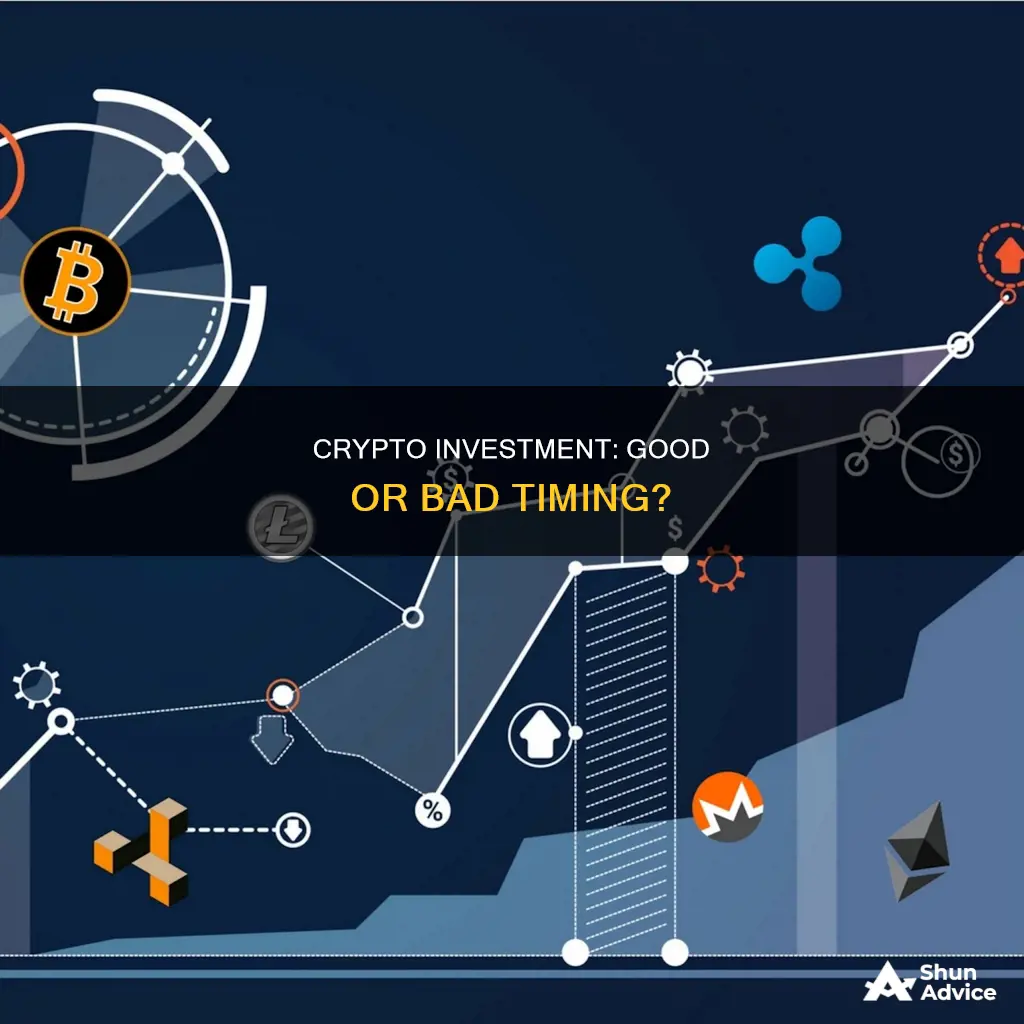
Investing in crypto is risky, but it can be a good investment if you do it properly and as part of a diversified portfolio. Cryptocurrencies are a highly volatile asset class that can experience significant price swings driven by market speculation, regulatory news, technological advancements, and macroeconomic trends.
While it is challenging to find the right time to invest in crypto, there are strategies to help you pick the right time for your crypto purchase. Dollar-Cost Averaging, for example, is a risk-reduced investment strategy that involves investing a fixed amount at regular intervals without aiming for specific price points.
It is important to understand the risks involved and conduct thorough research before investing in crypto.
| Characteristics | Values |
|---|---|
| Volatility | High |
| Risk | High |
| Returns | High |
| Investment strategy | Dollar-cost averaging, Time in the market, Timing the market |
| Security | Use reputable exchanges and secure crypto wallets |
| Taxation | Capital gains tax, Income tax, Wealth tax |
What You'll Learn

Crypto's volatility
Cryptos Volatility
Volatility is a measure of how much the price of an asset has moved up or down over a given period. Generally, the more volatile an asset is, the riskier it is considered to be as an investment. Volatile assets are more likely to offer either higher returns or higher losses over shorter periods of time than less volatile assets.
As a relatively new asset class, crypto is widely considered to be highly volatile. In other words, it is susceptible to significant upward and downward movements over short time periods. This volatility is driven by a number of factors, including market speculation, regulatory news, technological advancements, and macroeconomic trends.
Crypto market volatility is in a league of its own when compared to traditional markets. For instance, Bitcoin (BTC) has witnessed over eight 50% corrections in its 15 years of existence. However, Bitcoin has also managed to recover from each correction and reach new all-time highs, including a price of US$73,000 in March 2024.
The crypto market is still in its infancy and is undergoing growing pains. The asset class, the market, and its investors/speculators are still finding their feet during this early and high-growth phase. As a result, prices will continue to fluctuate as new participants enter the market and try to establish a consensus on the fair value of digital assets.
The relatively small size of the crypto market also contributes to its volatility. The total crypto market cap is just a fraction of the size of the total U.S. stock market. This limited liquidity and depth make it difficult for larger traders to enter or exit the market without affecting prices and moving the market.
Another factor influencing crypto volatility is the distribution between supply and demand. The limited supply of certain crypto assets, such as Bitcoin, which has a supply cap of 21 million coins, can lead to increased upward pressure on prices when there is sudden increased demand. This can be further compounded by the actions of large holders, often called "whales," who can significantly impact prices by buying or selling large quantities of a particular asset.
The crypto market's lack of comprehensive regulation also contributes to its volatility. Without clear regulations in place, the market is susceptible to high volatility and lacks the circuit breakers found in traditional markets to dampen volatility caused by panic selling or destructive events.
While crypto's volatility can be a challenge, it also presents opportunities for traders and investors. As the market matures and factors such as increased institutional participation and regulatory oversight take effect, volatility is expected to reduce over time.
Ondo Coin: A Worthy Investment?
You may want to see also

Timing the market
Short-Term vs. Long-Term Perspective
When deciding to time the market, it's essential to determine whether you're a short-term or long-term investor. Short-term investors aim to capitalise on short-term price fluctuations, buying when prices are low and selling when they are high. This strategy requires frequent trading and a keen eye on market trends and news. On the other hand, long-term investors adopt a "time in the market" strategy, holding onto their investments for extended periods, riding out the short-term volatility and focusing on long-term growth.
Market Volatility
The crypto market is known for its high volatility, driven by various factors such as market speculation, regulatory news, technological advancements, and macroeconomic trends. Before investing, it's crucial to understand the specific cryptocurrency you're interested in, its underlying technology, use cases, tokenomics, and the team behind it. Volatility can present opportunities for short-term gains but also carries significant risks.
Dollar-Cost Averaging
Dollar-cost averaging is an investment strategy that can help mitigate the risks of market timing. It involves investing a fixed amount of money in crypto at regular intervals, regardless of the price. This approach helps reduce the impact of short-term volatility by averaging out the cost of your investment over time. While it may not yield the highest returns, it can help avoid the risk of buying at market peaks.
Fundamental and Technical Analysis
Risk Management
It's important to remember that timing the market carries inherent risks. No one can predict the future with certainty, and crypto markets can be highly unpredictable. Therefore, it's crucial to manage your risk by diversifying your portfolio, setting stop losses, and only investing what you can afford to lose.
In conclusion, timing the crypto market requires a combination of market knowledge, analytical skills, and risk management strategies. It's a challenging endeavour, and there are no guarantees of success. However, by adopting a disciplined and well-informed approach, you can increase your chances of making profitable investment decisions.
Investors Betting on Bitcoin: How Many?
You may want to see also

Security concerns
Investing in cryptocurrencies comes with a host of security concerns. Crypto exchanges are vulnerable to hacking and other criminal activities, and security breaches have resulted in significant losses for investors. Therefore, it is crucial to choose a legitimate and secure exchange, such as Coinbase, Crypto.com, or Kraken. These platforms employ various security measures, including cold wallets, server security, and two-factor authentication (2FA).
Additionally, it is important to use secure crypto wallets to protect your investments. Hot wallets, which are connected to the internet, offer convenience but carry a higher risk of hacking. On the other hand, cold wallets, such as hardware or paper wallets, are offline and considered safer as they are not connected to the internet. However, cold wallets are also subject to physical theft or loss, so it is essential to keep them in a secure location.
Another security concern is the lack of regulatory oversight in the crypto space. The absence of a centralised authority or clear regulatory framework makes it challenging to recover funds in the event of a security breach or hack. This regulatory uncertainty also poses a risk to investors, as governments could suddenly impose restrictions or bans on cryptocurrencies, as seen in China.
Furthermore, cryptocurrency investors face the risk of fraud and scams. Phishing websites, fake wallets, and malware infections are common tactics used by scammers to gain access to users' private keys or seed words. It is crucial to be vigilant and only download wallets from official websites, avoid entering sensitive information on websites, and be cautious of suspicious emails or files.
Lastly, the decentralised nature of cryptocurrencies can lead to legal complications. The lack of a central authority backing the value of digital currencies means that investors may face challenges in resolving transaction disputes or ownership issues.
To summarise, while investing in cryptocurrencies can be lucrative, it is essential to be aware of the security concerns and take proactive measures to protect your investments. This includes choosing secure exchanges and wallets, enabling 2FA, being vigilant against scams, and staying informed about the evolving regulatory landscape.
Botcoin Investment: Worthwhile or Risky Venture?
You may want to see also

Regulatory risks
Governments and regulatory bodies have been increasing scrutiny on cryptocurrencies. In the US, the Securities and Exchange Commission (SEC) has been considering a raft of new cryptocurrency regulations, and the IRS has classified cryptocurrencies as property, meaning that they are subject to capital gains tax. In China, the government has banned cryptocurrency altogether. Crypto investors face the risk that new laws and regulations could affect the value of their holdings, or even make them illegal.
The regulatory environment for crypto is still evolving, and the future treatment of cryptocurrencies by governments and regulators is uncertain. This creates a degree of regulatory risk that investors need to be aware of. Crypto investors should also be mindful of the potential tax implications of their investments and consult a tax professional familiar with cryptocurrency.
In addition to the risk of new regulations, the decentralised and anonymous nature of cryptocurrency means that it is vulnerable to criminal activity such as fraud and money laundering. The lack of a central authority means that there may be no legal recourse if an investor is the victim of fraud or has their holdings stolen in a hack.
Overall, regulatory risks are a significant consideration for anyone thinking of investing in cryptocurrency. The regulatory environment is still developing, and the decentralised nature of crypto means that investors may face legal and financial risks.
Why Bitcoin Belongs in Your Investment Portfolio
You may want to see also

The role of media and public opinion
The media and public opinion play a crucial role in shaping the perception and adoption of cryptocurrencies. Public opinion surveys provide valuable insights into people's awareness, knowledge, trust, and usage of cryptocurrencies. For example, a survey of German internet users found that 9.2% owned cryptocurrencies, with a higher proportion of male owners, and the owners tended to be younger, more educated, and had higher incomes. Additionally, Google search data has been found to predict the price of Bitcoin, indicating the influence of public interest on the market.
Media outlets and financial publications, such as Forbes and The Motley Fool, offer a platform for experts and analysts to share their opinions and advice on investing in crypto. These sources provide valuable information on the risks and opportunities associated with crypto investments, helping individuals make informed decisions. For instance, some sources suggest that crypto is a good investment option for those seeking exposure to the demand for digital currency and are willing to take on the associated risks.
Public opinion, as shaped by the media, also influences the regulatory landscape surrounding cryptocurrencies. The SEC, for instance, has expressed skepticism about cryptocurrency and emphasized the need for crypto companies to comply with existing laws. Additionally, government agencies, such as the U.S. Office of Science and Technology Policy (OSTP), have sought public comments on crypto's energy consumption and its potential impact on the climate, indicating a growing concern about the environmental implications of crypto mining.
The media also plays a role in highlighting the benefits and potential of cryptocurrencies. For example, the blockchain technology underlying crypto is recognized as innovative and disruptive, with the potential to revolutionize various industries beyond finance, such as healthcare, retail, and education. Proponents of crypto believe it could become a global currency and offer a hedge against inflation.
In conclusion, the media and public opinion have a significant influence on the perception, adoption, and regulation of cryptocurrencies. They shape public trust, investment decisions, and the broader social context in which cryptocurrencies operate. As the crypto industry continues to evolve, the media and public opinion will likely remain crucial factors in its development and mainstream integration.
A Beginner's Guide: Investing in LGB Coin
You may want to see also
Frequently asked questions
Crypto is a good investment if you understand the risks involved. It is a highly volatile asset class that can experience significant price swings driven by market speculation, regulatory news, technological advancements, and macroeconomic trends.
Crypto has delivered tremendous profits for some investors, but it is also possible to lose significant sums. It is not a safe investment due to the risks of loss of capital, government regulations, fraud, and hacks.
The risks of investing in cryptocurrency include loss of capital, government regulations, fraud, and hacks. Crypto exchanges are vulnerable to being hacked, and investors can lose their digital assets if they don't have secure storage.
The potential for a new bull market in crypto in 2024 has sparked new interest in crypto investment. However, it is challenging to find the right time to invest due to the volatility of the market. It is essential to understand the risks and consider your investment horizon, risk appetite, and financial goals before investing.
To invest in crypto, you need to access a crypto exchange or platform, such as Coinbase, Binance, or eToro. You will also need a crypto wallet to store your digital assets, which can be provided by the exchange or a separate hot or cold wallet.







